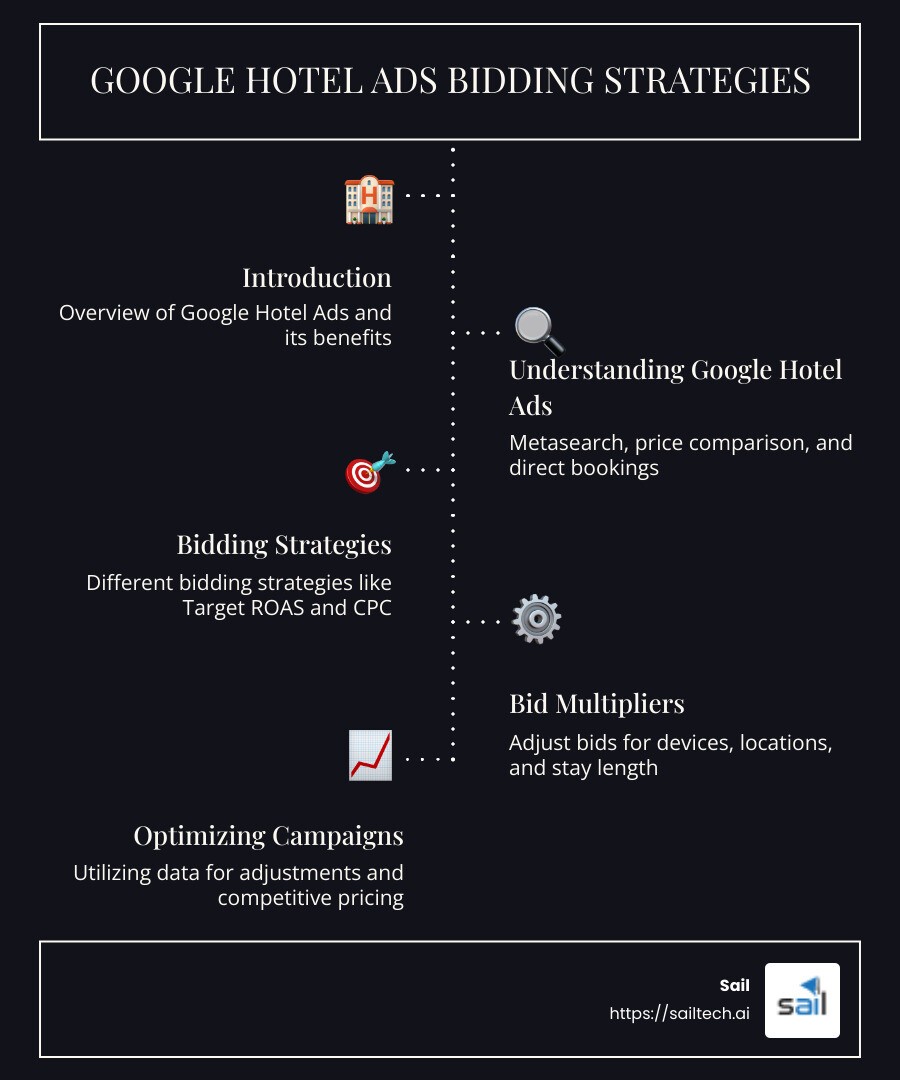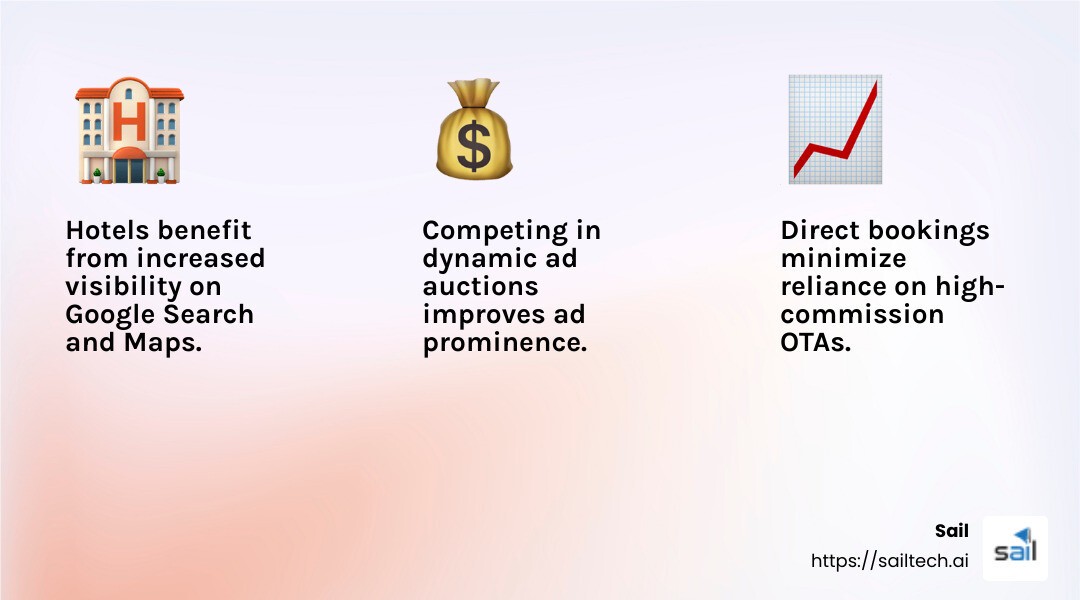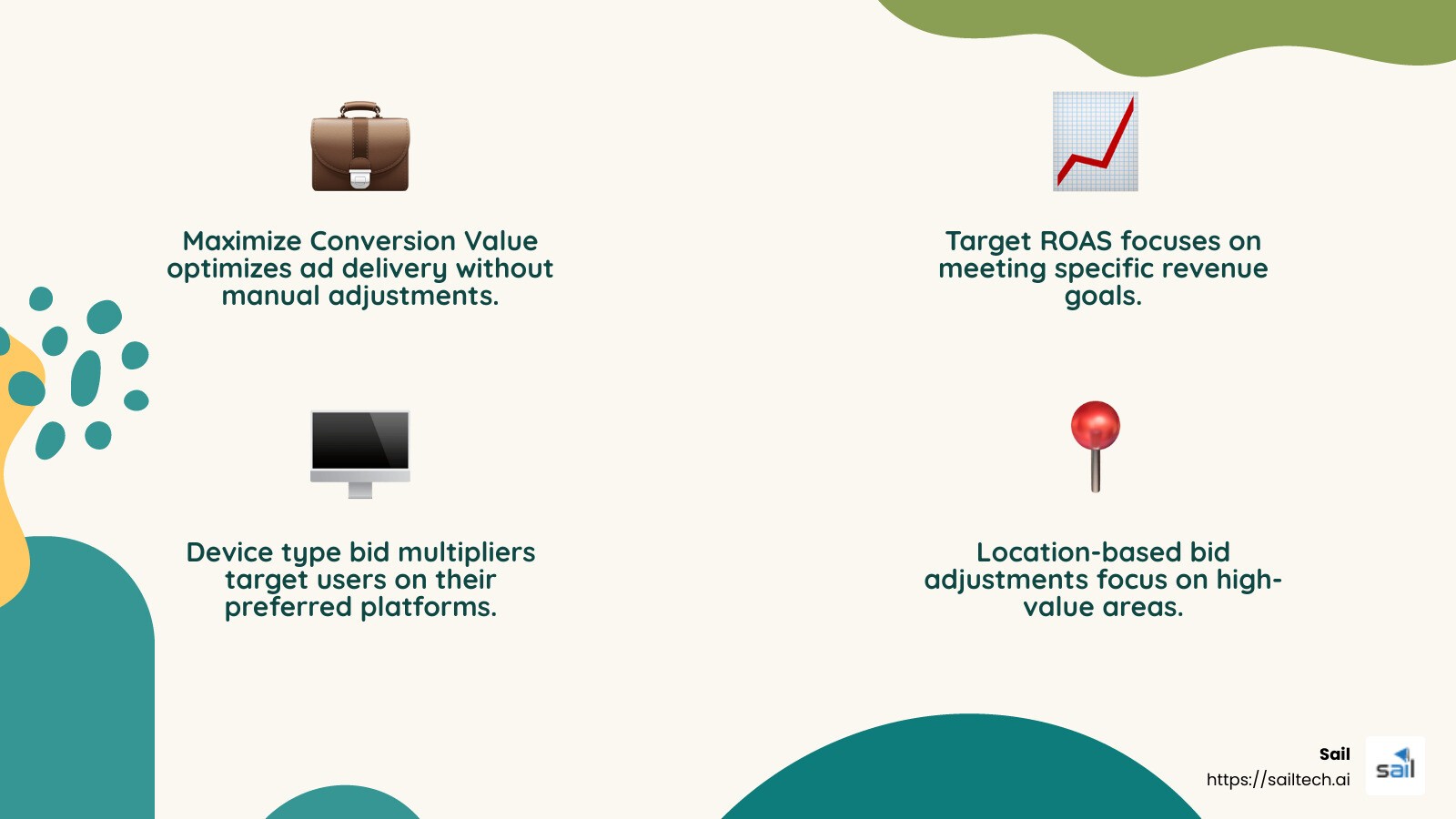Blogs /
Direct Bookings & Conversion
As travel demand evolves, hotel marketing is no longer just about visibility—it’s about being discovered where booking decisions are made. This report explores how search, social, and AI are reshaping guest acquisition.
Navigating google hotel ads bidding might seem daunting, but understanding it can open up significant opportunities for your hotel. This strategic approach optimizes your visibility on platforms like Google Search, Google Maps, and Google Travel, where travelers frequently search for and book hotels. By integrating effective bidding strategies, you can boost direct bookings, reduce dependency on online travel agencies (OTAs), and manage marketing costs efficiently.
Overview: Google Hotel Ads is a metasearch platform that allows hotels to appear in prime positions on Google, reaching potential guests directly.
Importance: Effective bidding on Google Hotel Ads can increase your hotel’s visibility and attract more direct bookings, offering a competitive edge over relying solely on OTAs.
Benefits: Reduction in OTA commissions, increased control over pricing, improved brand visibility, and the ability to reach guests during their booking journey.
My name is Shahar Rubin. With a background in tech and entrepreneurship, I founded Sail to help hotels reduce costs and boost direct bookings through optimized google hotel ads bidding. From my extensive experience, I guide businesses in leveraging AI-driven strategies for improved visibility and revenue.

Google hotel ads bidding terminology:
Understanding Google Hotel Ads
Google Hotel Ads is a powerful tool in the hospitality industry. It's a metasearch platform that allows hotels to showcase their real-time prices across various Google platforms, like Google Search, Google Maps, and Google Travel. This visibility is crucial because it puts your hotel right where potential guests are looking to book their next stay.
Metasearch and Price Comparison
Think of Google Hotel Ads as a boostd price comparison engine. When a traveler searches for a hotel, they see a list of options with prices from different booking channels. This transparency helps potential guests compare prices easily and choose the best deal. For hotels, this means you can compete directly with online travel agencies (OTAs) by offering competitive rates.
Boosting Direct Bookings
One of the biggest benefits of using Google Hotel Ads is the potential to increase direct bookings. By appearing in these searches, hotels can attract guests directly to their own booking platforms. This reduces reliance on OTAs, which often charge high commissions. More direct bookings mean more control over pricing and guest experience.

The Role of Bidding
To appear in these prime spots, hotels participate in a dynamic ad auction. This is where google hotel ads bidding comes into play. Hotels bid for their ads to be shown, and the highest quality ads with competitive bids will appear more prominently. This process ensures that guests see the most relevant and cost-effective options.
In summary, Google Hotel Ads is not just about visibility—it's about strategic positioning and capturing direct bookings. By leveraging this platform, hotels can improve their online presence, offer competitive pricing, and ultimately drive more revenue.
Next, we'll explore how the bidding process works and dive deeper into the strategies you can use to maximize your success with Google Hotel Ads.
How Google Hotel Ads Bidding Works
When it comes to Google Hotel Ads bidding, understanding the dynamics of the ad auction is key. In this section, we'll break down the types of bidding strategies available and how bid multipliers and adjustments can optimize your campaign.
Types of Bidding Strategies
The bidding process for Google Hotel Ads operates through a dynamic ad auction. This means that every time a potential guest searches for a hotel, an auction takes place in real-time. Hotels compete by placing bids, and the highest quality ads with competitive bids earn the top spots.
Here are the main bidding strategies you can use:
Maximize Conversion Value: This strategy automatically adjusts your bids to get the most conversion value possible. It's great for optimizing ad delivery without constant manual tweaks.
Target ROAS (Return on Ad Spend): Here, you set a target ROAS, and Google optimizes your bids to achieve it. This is ideal if you have specific revenue goals in mind.
CPC% (Cost Per Click Percentage): You set a maximum CPC as a percentage of the booking price. This gives you control over how much you're willing to spend relative to booking value.
Manual CPC: Allows you to set a maximum CPC and requires manual updates throughout the campaign. It offers more control but demands constant attention.
Improved CPC: Similar to Manual CPC, but Google can adjust your bids in real-time to compete better in auctions, enhancing your chance of winning a spot.
Performance Max for Travel Goals: This multi-channel strategy uses Google AI to deliver ads across all of Google's platforms, aiming to reach the right audience with minimal effort.
Bid Multipliers and Adjustments
Once you've chosen a bidding strategy, further refine your approach with bid multipliers. These allow you to adjust bids based on specific factors, ensuring your ads are shown to the most relevant audience.
Device Type: Adjust bids based on whether potential guests are searching on mobile, desktop, or tablet. This helps you target the right platform for your audience.
Location: Increase bids for searches originating in high-value locations or areas where your hotel is in demand.
Length of Stay: Tailor your bids depending on how long guests plan to stay. Longer stays might warrant higher bids due to higher potential revenue.
Using these strategies and adjustments, you can fine-tune your Google Hotel Ads campaigns to maximize visibility and bookings. This approach not only helps in achieving better ad placement but also ensures efficient use of your advertising budget.

Next, we'll discuss transitioning from commission-based bidding and explore alternative strategies that align with the latest privacy standards.
Transitioning from Commission-Based Bidding
As the landscape of digital advertising evolves, so do the strategies we use. Google is phasing out commission-based bidding, and adapt to new methods. This transition not only aligns with changing privacy standards but also ensures that your hotel remains competitive in attracting guests.
Important Dates and Actions
Key Dates to Remember:
April 30, 2024: This is the last day to start new Hotel Ads campaigns using Commissions (per Stay) or Commissions (per Conversions) strategies. After this, you'll need to switch to alternative bidding strategies for any new campaigns.
October 31, 2024: Existing campaigns using commission-based bidding can continue until this date. However, it's wise to start transitioning earlier to ensure a smooth changeover.
February 20, 2025: After this date, all campaigns using commission-based strategies will cease to serve. Make sure to have your new strategies in place well before this deadline.
November 2025: The final date for reconciliation of Commissions (per Stay). Any outstanding reconciliations should be completed by this time to avoid billing complications.
Recommended Bidding Strategies
With commission-based bidding being sunsetted, it's time to consider alternative strategies that align with the latest privacy standards. Here are some recommended options:
Target ROAS (Return on Ad Spend): This strategy is highly recommended for its focus on maximizing revenue. By setting a target ROAS, Google will adjust your bids to help achieve your desired return. This method is excellent for hotels with specific revenue goals.
Improved CPC (Cost-Per-Click): This strategy allows Google to adjust your manual bids in real-time, increasing your chances of winning auctions. It's a good choice if you prefer more control over your bids but still want some flexibility.
Performance Max for Travel Goals: This is a multi-channel strategy that leverages Google AI to deliver ads across all of Google's platforms. It aims to reach the right audience with minimal effort, making it a powerful tool for expanding your hotel's reach.
By transitioning to these strategies, you not only comply with upcoming changes but also position your hotel for success in a privacy-focused digital landscape. The key is to act swiftly and adjust your campaigns well before the deadlines to ensure seamless performance.
Next, we'll explore how to optimize your Google Hotel Ads campaigns for even better results.
Optimizing Your Google Hotel Ads Campaigns
When it comes to Google Hotel Ads bidding, optimizing your campaigns is crucial for maximizing returns. Here are some best practices and advanced strategies to help you get the most out of your ad spend.
Best Practices for Google Hotel Ads
Accurate Rates: Ensure that the rates you feed into Google match what's on your booking engine. Inaccurate rates can hurt your ad performance and lead to lost trust with potential guests.
High-Resolution Photos: Your Google Business profile should be complete with high-quality images. Photos are the first impression for many travelers, so make sure they reflect your hotel’s best features.
Bid Adjustments: Use bid adjustments to fine-tune your ad delivery. Adjust bids based on factors like device type, location, and length of stay. This can help you target the most valuable audiences.
Competitive Pricing: Keep your pricing competitive. Your rates should be lower than or on par with OTAs (Online Travel Agencies) to improve your ad visibility and appeal to price-sensitive travelers.
Hotel Callouts: Use callouts to highlight special features like "Free Cancellation" or "Complimentary Breakfast." These can make your listing more attractive to potential guests.
Using Performance Max for Travel Goals
Performance Max is a game-changer for hotels looking to boost direct bookings. This multi-channel campaign taps into Google AI to deliver your ads across all of Google's platforms, reaching the right audience with minimal setup.
Multi-Channel Reach: Your ads will appear on Google Search, Maps, YouTube, and more, ensuring maximum visibility.
Google AI: The AI optimizes your ads in real-time, learning from historical data to improve targeting and performance. This means your ads reach those most likely to book.
Right Audience: Performance Max helps you connect with potential guests who are actively searching for travel options, increasing the likelihood of conversions.
By implementing these strategies, you can improve your Google Hotel Ads campaigns, attract more direct bookings, and ultimately, increase your hotel's revenue.
Next, we'll dive into common questions about Google Hotel Ads bidding to further clarify the process.
Frequently Asked Questions about Google Hotel Ads Bidding
What should my bid be on Google Ads?
Setting the right bid for your Google Hotel Ads is key to balancing costs and returns. Start by determining your max CPC (Cost Per Click). This is the highest amount you're willing to pay for a click on your ad. To find your max CPC, consider the break-even point—the point where your ad spend equals the revenue generated from bookings. Ideally, your bid should allow for a profit margin beyond this point.
Pro Tip: Use historical data to refine your bids. Track how different bid levels impact your bookings and adjust accordingly to maximize profit.
How does Google Ads bidding work?
Google Ads uses a dynamic ad auction system for bidding. Each time someone searches for a hotel, an auction determines which ads appear and in what order. Your bid is crucial, but it's not the only factor. Google also considers your ad's Quality Score, which includes the relevance and quality of your ad and landing page.
Bid Focus: Decide whether to focus on conversions, clicks, or impressions. This focus will shape your bid strategy and impact your campaign's success.
Campaign Type: Choose between different campaign types like Performance Max or Manual CPC. Each has unique features and benefits, so select one that aligns with your goals.
What is the minimum bid for Google Ads?
There's no fixed minimum bid for Google Ads. Instead, your success depends on the competitiveness of your bid relative to others in the auction. A higher Quality Score can help your ad appear more often and at a lower cost.
Competitiveness: Keep an eye on market trends and competitor rates to ensure your bids remain competitive. Adjust your strategy as needed to maintain visibility.
By understanding these elements, you can effectively manage your Google Hotel Ads bidding and optimize your campaigns for better results. Next, we'll explore how transitioning from commission-based bidding can impact your strategy.
Conclusion
In this guide, we've explored the intricacies of Google Hotel Ads bidding and how it plays a crucial role in boosting your hotel's visibility and direct bookings. Understanding the dynamics of ad auctions, choosing the right bidding strategies, and utilizing tools like Performance Max can significantly improve your advertising efforts.
At Sail, we offer a unique, risk-free model that simplifies this process. Our AI-driven marketing solutions cover all ad spend, and you only pay for the bookings we generate. This approach not only reduces financial risk but also ensures your hotel gets featured prominently on essential platforms like Instagram, Metasearch, and Google.
Our focus on increased visibility means more potential guests see your hotel, leading to more direct bookings. By seamlessly integrating with your existing hotel systems, we make it easy for you to benefit from our advanced marketing techniques without any long-term commitments.
Ready to lift your hotel's marketing game? Find how our innovative solutions can work for you by visiting our Sail Modern Hotel Marketing page. Let us help you steer Google Hotel Ads with confidence and ease.
Share:
20 years of hospitality lessons. No fluff. No spam
Join 500+ hospitality pros getting our best growth playbooks.
© 2026 Sail. All rights reserved.

